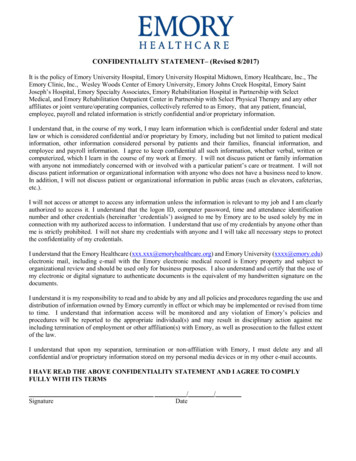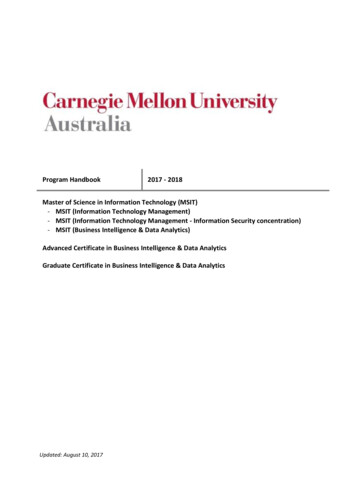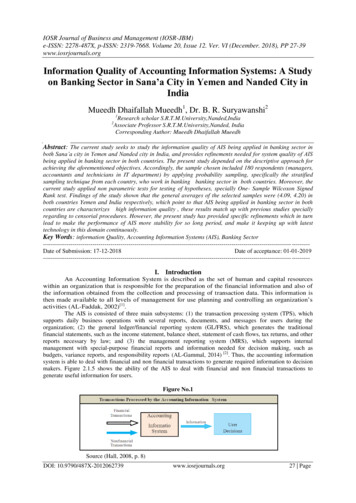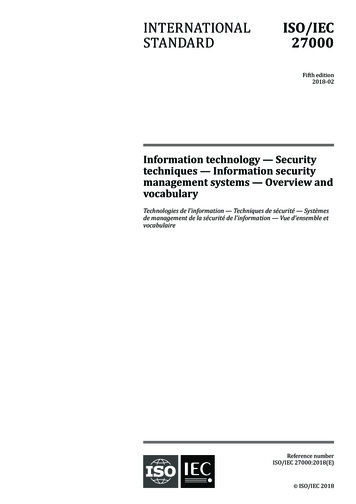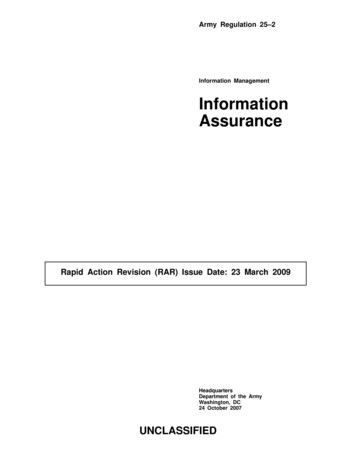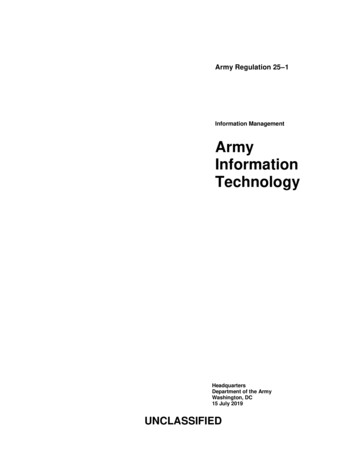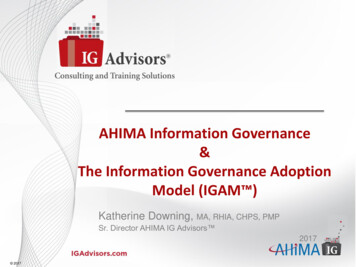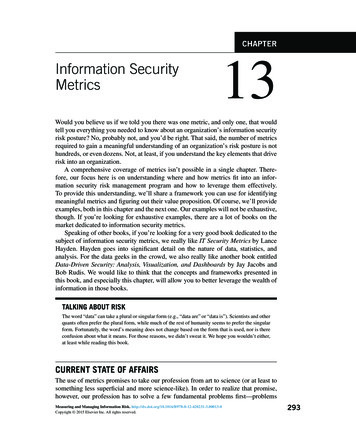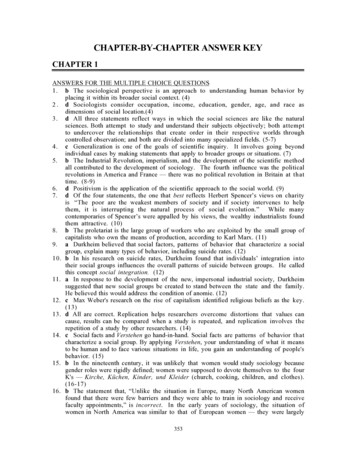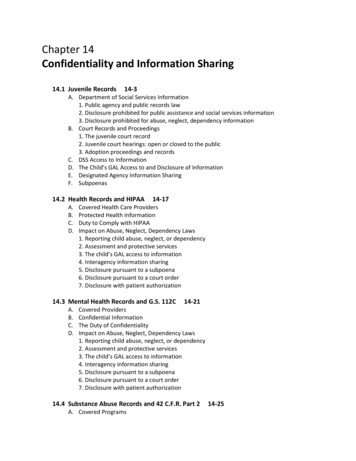
Transcription
Chapter 14Confidentiality and Information Sharing14.1 Juvenile Records14-3A. Department of Social Services Information1. Public agency and public records law2. Disclosure prohibited for public assistance and social services information3. Disclosure prohibited for abuse, neglect, dependency informationB. Court Records and Proceedings1. The juvenile court record2. Juvenile court hearings: open or closed to the public3. Adoption proceedings and recordsC. DSS Access to InformationD. The Child’s GAL Access to and Disclosure of InformationE. Designated Agency Information SharingF. Subpoenas14.2 Health Records and HIPAAA.B.C.D.14-17Covered Health Care ProvidersProtected Health InformationDuty to Comply with HIPAAImpact on Abuse, Neglect, Dependency Laws1. Reporting child abuse, neglect, or dependency2. Assessment and protective services3. The child’s GAL access to information4. Interagency information sharing5. Disclosure pursuant to a subpoena6. Disclosure pursuant to a court order7. Disclosure with patient authorization14.3 Mental Health Records and G.S. 112CA.B.C.D.14-21Covered ProvidersConfidential InformationThe Duty of ConfidentialityImpact on Abuse, Neglect, Dependency Laws1. Reporting child abuse, neglect, or dependency2. Assessment and protective services3. The child’s GAL access to information4. Interagency information sharing5. Disclosure pursuant to a subpoena6. Disclosure pursuant to a court order7. Disclosure with patient authorization14.4 Substance Abuse Records and 42 C.F.R. Part 2A. Covered Programs14-25
Ch. 14: Confidentiality and Information Sharing (Oct. 1, 2017)14-2B. Confidential InformationC. Duty Imposed by Federal Substance Abuse Records LawD. Impact on Abuse, Neglect, Dependency Laws1. Reporting child abuse, neglect, or dependency2. Assessment and protective services3. The child’s GAL access to information4. Interagency information sharing5. Disclosure pursuant to a subpoena6. Disclosure pursuant to a court order7. Disclosure with patient authorization14.5 Education Records and FERPA14-30A. IntroductionB. Consent Required for Disclosure1. Consent required2. Personally identifiable information3. Education recordsC. Exceptions to Consent Requirement1. Overview2. Disclosure to child welfare agency responsible for child3. Disclosure to comply with judicial order or subpoena4. Disclosure for health or safety emergency5. Disclosure to school personnel and schools where child seeks to enroll6. Disclosure of directory informationD. Documentation of Disclosure, Redisclosure, and Use of InformationE. Complaints and EnforcementResources:For a discussion of confidentiality and disclosure and the laws discussed in this Chapter, seeAIMEE WALL, DISCLOSING PROTECTIVE SERVICES INFORMATION: A GUIDE FOR NORTH CAROLINASOCIAL SERVICES AGENCIES (UNC School of Government, 2015).For a searchable online database of statutes, regulations, cases, and guidance materials that applyto confidentiality requirements for protective services and public assistance programs, see theSocial Services Confidentiality Research Tool (UNC School of Government, 2015).For discussions of confidentiality in the context of social services programs, including a usefulframework for analyzing confidentiality issues, see the following bulletin series from the UNCSchool of Government (formerly the Institute of Government): John L. Saxon, Confidentiality and Social Services (Part I): What Is Confidentiality?, SOCIALSERVICES LAW BULLETIN No. 30 (UNC Institute of Government, Feb. 2001). John L. Saxon, Confidentiality and Social Services (Part II): Where Do Confidentiality RulesCome From?, SOCIAL SERVICES LAW BULLETIN No. 31 (UNC Institute of Government, May2001). John L. Saxon, Confidentiality and Social Services (Part III): A Process for Analyzing IssuesAbuse, Neglect, Dependency, and Termination of Parental Rights Proceedings in North Carolina
Ch. 14: Confidentiality and Information Sharing (Oct. 1, 2017)14-3Involving Confidentiality, SOCIAL SERVICES LAW BULLETIN No. 35 (UNC Institute ofGovernment, April 2002).NC DHHS DSS Form:DSS-5291, Consent for Release of Confidential Information (Dec. 2013).14.1 Juvenile RecordsMost information related to abuse, neglect, or dependency cases is confidential and hasspecial protections under laws governing departments of social services, juvenile courtproceedings, and adoption proceedings.A. Department of Social Services Information1. Public agency and public records law. Each of North Carolina’s 100 counties are politicalsubdivisions of the state. Each county must provide social services programs pursuant toChapters 108A (social services) and 111 (aid to the blind) of the General Statutes. G.S. 153A255. The county board of commissioners creates agencies of the county government, whichincludes a department of social services (DSS). See G.S. 153A-76.Note, for purposes of this Manual, “department of social services” or “DSS” refers to adepartment as defined by G.S. 7B-101(8a) regardless of how it is titled or structured.The county DSS administers public assistance and social services programs. Public assistanceprograms relate to financial benefits that assist the county’s indigent citizens (e.g., Food andNutrition Services, Work First), and social services programs relate to the protection of thecounty’s citizens (e.g., child welfare, public guardianship). See G.S. 108A-14; 108A-15; seealso G.S. Chapter 108A, Articles 2 (Programs of Public Assistance), 3 (Social ServicesPrograms), 6 (Protection of the Abused, Neglected, or Exploited Disabled Adult Act), and 6A(Protection of Disabled and Older Adults from Financial Exploitation).A public record includes documents, photographs, recordings, and other documentarymaterials made or received pursuant to law or ordinance in connection with the transaction ofpublic business by any agency of the North Carolina government or its subdivisions. G.S.132-1(a). Generally, records maintained by a county DSS are public records. People have aright to have access to public records. G.S. 132-1(b). However, a statutory exception mayapply that limits and/or prohibits disclosure of a public record. The confidentiality of andaccess to DSS records are governed by several state and federal laws and regulations, some ofwhich are discussed below.Resources:For a discussion about public records and disclosure, see Frayda Bluestein, Is This a Public Record? A Framework for Answering Questions AboutPublic Records Requests, UNC SCH. OF GOV’T: COATES’ CANONS: NC LOCALGOVERNMENT LAW BLOG (June 9, 2010).Abuse, Neglect, Dependency, and Termination of Parental Rights Proceedings in North Carolina
Ch. 14: Confidentiality and Information Sharing (Oct. 1, 2017) 14-4DAVID LAWRENCE, PUBLIC RECORDS LAW FOR NORTH CAROLINA LOCAL GOVERNMENTS(UNC School of Government, 2d ed. 2010).For further information about social services, see JOHN L. SAXON, SOCIAL SERVICES INNORTH CAROLINA (UNC School of Government, 2008).For information about consolidated human services agencies, see “Consolidated HumanServices Agencies (CHSAs)” on the UNC School of Government website.2. Disclosure prohibited for public assistance and social services information. One of theconfidentiality statutes that applies to DSS is G.S. 108A-80, and it covers client (includingapplicant) information generally. Absent limited statutory exceptions, G.S. 108A-80(a)prohibits the disclosure of names or other information concerning persons applying for orreceiving public assistance or social services that may be directly or indirectly derived fromDSS records. Although the term “social services” is not defined, statutory context and usageindicate that child welfare is clearly encompassed within the scope of the expansive term. Forexample, child welfare services are specifically included in Article 3 of G.S. Chapter 108A,which is titled “Social Services Programs”. Specific reference is also made to “grants-in-aidavailable for social services under the Social Security Act.” G.S. 108A-71. Child welfareservices and foster care and adoption maintenance payments are funded by Titles IV-B andIV-E of the Social Security Act. See e.g., 42 U.S.C. 622; 42 U.S.C. 671; 45 C.F.R. Parts 1355,1356, and 1357.G.S. 108A-80(a) has broad application. It makes it unlawful for “any person to obtain,disclose or use, or to authorize, permit, or acquiesce in the use of” the protected information.This particular subsection, G.S. 108A-80(a), does not include a criminal penalty; however, aviolation is likely a misdemeanor. See G.S. 108A-80(b), (c) (both stating a violation of “thissection” is a Class 1 misdemeanor); see also State v. Bishop, 228 N.C. 371 (1947) (holdingcommon law authorizes punishment by misdemeanor when a statute, in the interests of thepublic, forbids an act and does not expressly include a penalty).In addition to the statute, state regulations (or Rules) based on G.S. 108A-80 that addressconfidentiality and access to client records are set forth in Title 10A of the North CarolinaAdministrative Code (N.C.A.C.) Chapter 69. The Rules consist of five sections: general provisions,safeguarding client information,client access to records,release of client information, anddisclosure of information without client consent.Under the Rules, the director of the state Division of Social Services or a county departmentof social services is required to disseminate written policy to and provide trainings for allpersons with access to client information. 10A N.C.A.C. 69.0204; see 10A N.C.A.C.69.0101(4) (definition of “director”). An employee who violates the confidentiality Rules issubject to disciplinary action including suspension or dismissal. 10A N.C.A.C. 69.0205.Abuse, Neglect, Dependency, and Termination of Parental Rights Proceedings in North Carolina
Ch. 14: Confidentiality and Information Sharing (Oct. 1, 2017)14-5The Rules specifically address conflict of laws with federal or other state statutes orregulations and require that DSS follow the statutes or regulations that provide moreprotection for the client. 10A N.C.A.C. 69.0201. The federal Child Abuse Prevention andTreatment Act (CAPTA), Titles IV-E and IV-B of the Social Security Act, and NorthCarolina’s Juvenile Code (G.S. Chapter 7B) provide for additional restrictions on thedisclosure of confidential information as it relates to information concerning a juvenile’sabuse, neglect, or dependency. See 42 U.S.C. 5106a(b)(2)(B)(viii) (xi); 42 U.S.C. 671(a)(8);45 C.F.R. 1355.21(a); G.S. 7B-302(a1); 7B-2901(b); 7B-3100.3. Disclosure prohibited for abuse, neglect, dependency information. In addition to thedisclosure prohibition for social services client records under G.S. 108A-80, the JuvenileCode addresses the confidentiality and disclosure of DSS records related to abuse, neglect, ordependency in three different statutes: G.S. 7B-302(a1), 7B-2901(b), and 7B-3100.Additionally, the Rules regulating confidentiality of DSS child protective services informationare found in 10A N.C.A.C. 70A.G.S. 7B-302(a1) requires that all information received by DSS be held in “strictestconfidence” unless a disclosure is authorized by statute. The requirement to maintain theinformation in “strictest confidence” starts when DSS first receives information about a child,typically from a report of suspected abuse, neglect, or dependency. DSS must maintain a caserecord for a child for whom protective services are initiated or who the court places in thecustody of a DSS. 10A N.C.A.C. 70A.0112. The case record contains information about theassessment; family background information; safety responses; the case decision; notificationsmade to the family and others; the family services case plan and reviews of the case plan; andif applicable, court pleadings and reports, medical and psychological reports, and a summaryof services. G.S. 7B-2901(b); 10A N.C.A.C. 70A.0112. The case record is confidential andinformation from it may only be disclosed in accordance with the Juvenile Code or otherapplicable law. 10A N.C.A.C. 70A.0112(a); see G.S. 7B-302(a1); 7B-2901(b); 10A N.C.A.C.70A.0113.Resource: For information about DSS policies and procedures related to confidentiality inthe child welfare setting, see 1 DIV. OF SOC. SERVS., N.C. DEP’T OF HEALTH & HUMANSERVICES, FAMILY SERVICES MANUAL CH. VIII § 1428 (July 2008). Note, DSS polices,currently located here, are being revised.(a) Exceptions authorizing disclosure. There are a number of statutory exceptions to therequirement of confidentiality for DSS records and information. Circumstances affecting the reporter. There is an extra layer of protection for theidentity of the person who made the report of a child’s suspected abuse, neglect, ordependency. A reporter’s identity is confidential and may only be disclosed whenauthorized by court order or when the disclosure is to a federal, state, or localgovernment entity or agent when that entity demonstrates a need for the reporter’sname to carry out its mandated responsibilities. G.S. 7B-302(a1)(1a); 7B-303(e)(interference or obstruction petition); 7B-700(a) (reporter’s identity may not beshared); see Ritter v. Kimball, 67 N.C. App. 333 (1984) (holding trial court did notAbuse, Neglect, Dependency, and Termination of Parental Rights Proceedings in North Carolina
Ch. 14: Confidentiality and Information Sharing (Oct. 1, 2017)14-6abuse its discretion in limiting in a custody action the discovery of the reporter’sidentity based on (1) the statute requiring information received by DSS concerningreports of abuse or neglect be held in “strictest confidence” and the trial court’sperception of the purpose of that statute as encouraging the reporting of abuse orneglect, and (2) G.S. 1A-1, Rule 26(c), which protects a person from “unreasonableannoyance, embarrassment, oppression, or undue burden”).DSS is required to disclose certain information to the reporter, specifically, whetherthe report was accepted for an assessment and/or referred to the appropriate lawenforcement agency; whether there was a finding of abuse, neglect, or dependency;and whether and what action DSS is taking to protect the juvenile. G.S. 7B-302(f), (g).Resource: Sara DePasquale, A/N/D Reporting: Rights, Protections, and ProsecutorReview. UNC SCH. OF GOV’T: ON THE CIVIL SIDE BLOG (June 21, 2017). Discovery and parties sharing information. The Juvenile Code addresses informationsharing among the parties and discovery in abuse, neglect, dependency, andtermination of parental rights proceedings. When a juvenile case is pending, DSS isauthorized to share with any other party information that is relevant to the subjectmatter of the action. G.S. 7B-700(a). See G.S. 7B-302(a1)(2) and (5); 7B-2901(b)(1)and (4). There may be a local rule or administrative order that addresses informationsharing among the parties (including the sharing of predisposition reports) and the useof discovery. G.S. 7B-700(b); 7B-808(c). Although G.S. 7B-700(c) permits parties tofile motions for discovery, they may do so only if they have been unable to obtaininformation through information sharing authorized by G.S. 7B-700(a) and local rules(if applicable). See G.S. 7B-700(b). Motions for protective orders are a means bywhich any party can seek to protect information that he or she believes should not bedisclosed. Requests for a protective order in a juvenile proceeding are governed byG.S. 7B-700(d). Information that is obtained through discovery or information sharingauthorized by G.S.7B-700 may not be redisclosed if the redisclosure is prohibited bystate or federal law. G.S. 7B-700(e).See Chapters 4.6 (discussing discovery) and 7.2.E.3 (discussing predispositionreports). The child’s guardian ad litem (GAL). The Juvenile Code gives the child’s GAL theauthority to obtain any information or reports, whether or not confidential, that may inthe GAL’s opinion be relevant to the case. This includes information received andmaintained by DSS. G.S. 7B-302(a1)(2); 7B-2901(b)(1). The only privilege that maybe invoked to prevent the GAL from obtaining the information is the attorney-clientprivilege. G.S. 7B-601(c). Absent a court order or statutory authorization, the GAL isrequired to keep information confidential. G.S. 7B-601(c). For a further discussion ofa GAL’s access to information and disclosures by a GAL generally, see section14.1.D, below.Abuse, Neglect, Dependency, and Termination of Parental Rights Proceedings in North Carolina
Ch. 14: Confidentiality and Information Sharing (Oct. 1, 2017)14-7 The child. The child has a right to examine his or her DSS records, even after reachingthe age of majority or being emancipated. G.S. 7B-302(a1)(2); 7B-2901(b)(1). Thisright to examine the records includes the child’s attorney. 10A N.C.A.C.70A.0113(a)(2). Law enforcement and district attorney. In certain circumstances, DSS will berequired to notify law enforcement and the district attorney of a report or results of itsassessment. If DSS receives a report that a child may have been physically harmed asa result of a crime that was not committed by the child’s parent, guardian, custodian,or caretaker, the director must report that information to the district attorney (ordesignee) and the appropriate law enforcement agency so that the initiation of acriminal investigation and possible prosecution can commence. G.S. 7B-307(a). If,during the course of its assessment, DSS finds evidence that the child may have beenabused, DSS must report those findings to the district attorney (or designee) and theappropriate law enforcement agency so as to coordinate the criminal investigationwith the DSS assessment. G.S. 7B-307(a). In both situations, DSS must make animmediate oral report and a subsequent written report within forty-eight hours afterreceiving the information. G.S. 7B-307(a). If a report alleges that a child isabandoned, DSS must request law enforcement investigate through the NorthCarolina Center for Missing Persons and other national and state resources. G.S. 7B302(a).If the person who reports the suspected abuse, neglect, or dependency requests aprosecutor review of a DSS decision not to file a petition, DSS must allow the districtattorney (or designee) to access the case record. G.S. 7B-305; 10A N.C.A.C.70A.0113(c).Resource: Sara DePasquale, A/N/D Reporting: Rights, Protections, and ProsecutorReview, UNC SCH. OF GOV’T: ON THE CIVIL SIDE BLOG (June 21, 2017). Government entity to protect a child. DSS must disclose confidential information toany federal, state, or local government entity or its agent that needs the information toprotect a child from abuse or neglect. G.S. 7B-302(a1)(1). The government entity mayredisclose confidential information received from DSS if redisclosure is for purposesdirectly connected with carrying out the entity’s mandated responsibilities. G.S. 7B302(a1)(1).If DSS receives a report of a child’s suspected maltreatment occurring in a child carefacility, DSS must notify the North Carolina Department of Health and HumanServices (NC DHHS) within twenty-four hours or on the next working day afterreceiving the report. G.S. 7B-307(a); see G.S. 110-105.3(a), (c).Practice Note: Effective January 1, 2016, investigations and responses involvingprotective actions and sanctions involving suspected child maltreatment occurring in achild care facility are part of the child care licensing system of the NC DHHS DivisionAbuse, Neglect, Dependency, and Termination of Parental Rights Proceedings in North Carolina
Ch. 14: Confidentiality and Information Sharing (Oct. 1, 2017)14-8of Child Development and Early Education and are no longer regulated by the JuvenileCode. S.L. 2015-123.Resource: For more information about alleged child maltreatment occurring in a childcare facility, including mandated reporting, investigations, and confidentiality of thoserecords, see SARA DEPASQUALE, Suspected Child Maltreatment Occurring in a ChildCare Facility (UNC School of Government, 2016) supplemental Chapter 13a in JANE
SOCIAL SERVICES AGENCIES (UNC School of Government, 2015). For a searchable online database of statutes, regulations, cases, and guidance materials that apply to confidentiality requirements for protective services and public assistance programs, see the Social Services Confidentiality Researc
